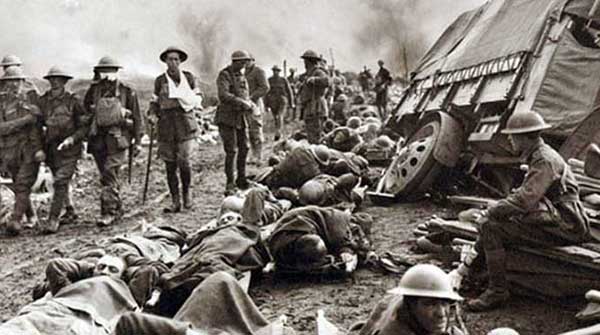Unravelling the blame game: Exploring the complex factors behind the First World War
 For as long as I can remember, the subject of who or what to blame for the First World War has been a question with many suggested answers. And reality being the messy beast that it is, there are undoubtedly degrees of truth in most of them.
For as long as I can remember, the subject of who or what to blame for the First World War has been a question with many suggested answers. And reality being the messy beast that it is, there are undoubtedly degrees of truth in most of them.
The proffered explanations vary. For instance:
The European arms build-up had created a strong impulse to put those weapons to use; the existence of alliances meant that countries could find themselves entangled in conflicts where they had no national interest; the rise of identity politics had accentuated ethnically-driven grievance, resentment and paranoia; a century of relative European peace had made war look like a great adventure; and so on.
There was also the matter of Germany, the mid-19th century unification of which had created a new power that generated substantial anxiety in others. Whether the issue was iron and steel production, manufacturing capacity or birth rate, the new Germany was handily outstripping its neighbours.
 |
| Related Stories |
| Our world was forged in the trenches of the Great War
|
| The Habsburgs: Rise and fall of Europe’s premier dynasty
|
| The unwelcome consequences of the collapse of empires
|
And let’s not forget Kaiser Wilhelm II. Bombastic and in love with attention, he was the sort of guy who seemed to validate the worst fears about German intent. Kaiser Bill, as he came to be caricatured, was perfectly cast for the role of bogeyman.
In his new book The Middle Kingdoms, historian Martyn Rady doesn’t dismiss these factors. But he believes that if we’re looking for the state actor that was the most serious threat to peace, fingering Germany is “barking up the wrong tree.” Instead, that dubious distinction belongs to the Habsburg Empire of Austria-Hungary and its fear of losing territory, influence and status.
While Austria itself was relatively small, the Habsburgs had been in the imperial business since the Middle Ages. They managed this by a combination of military force, wiliness and fecundity, the latter coming in handy with respect to acquiring territory through marriage. And although past its peak, the empire had a population of 50 million in 1910, which made it the third most populous state in Europe.
But it wasn’t a cohesive entity – its multi-national character required mobilization posters to be written in 15 languages! And the rise of ethnic consciousness rendered it susceptible to both internal secessionist movements and externally-driven land grabs. Developments in the Balkans, particularly the emergence of Serbia, were a particular worry.
Rady describes it this way: “Serbia’s politicians were known to be casting greedy eyes on Habsburg Bosnia and the Serb-populated parts of southern Hungary. Austrian diplomats now began talking excitedly of a showdown between Slavs and Teutons, and of a Darwinist struggle for survival in the Balkans that would usher in what they hoped would be a ‘totally new epoch’.”
So Serbia needed to be taught a lesson. And a Serbian gunman’s June 1914 assassination of the heir to the Austro-Hungarian throne provided a suitable justification.
It was at this point that alliances became dangerous, and what Rady calls “blank cheques” ushered in catastrophe. Germany promised to support its Austrian ally in whatever punishment it decided to impose on Serbia. And France made a similar commitment to its Russian ally in the event that Russia felt compelled to come to the defence of fellow Slavs in Serbia.
Rady again: “The two cheques were decisive. They gave Austria-Hungary and Russia the confidence to go to war and transformed what had originally been a local dispute into a general European war.”
But what would have happened if Britain had decided to sit it out?
Notwithstanding the 1904 Entente Cordiale with France and the 1839 treaty with Belgium, as late as July 31 – a mere four days before Britain went to war – only two members of the cabinet were explicitly in favour of intervention. Britain had no territorial interests to protect in Europe, nor was the continent particularly important to it economically.
Had Britain stood aside, Germany would almost certainly have won, thereby establishing hegemony over continental Europe. Bearing German war aims in mind, the likely economic consequence would have been a European Customs Union centred in Berlin and involving Germany, France, Holland, Belgium, Denmark, Austria-Hungary and perhaps others.
In addition, Germany’s two main allies – the Austro-Hungarian and Ottoman Empires – would have survived, at least for a while. And this survival would have had implications extending beyond the prerogatives of their respective governing elites in Vienna and Constantinople. The Middle East, for instance, might look quite different today.
Blank cheques have consequences.
Troy Media columnist Pat Murphy casts a history buff’s eye at the goings-on in our world. Never cynical – well, perhaps a little bit.
For interview requests, click here.
The opinions expressed by our columnists and contributors are theirs alone and do not inherently or expressly reflect the views of our publication.
© Troy Media
Troy Media is an editorial content provider to media outlets and its own hosted community news outlets across Canada.
